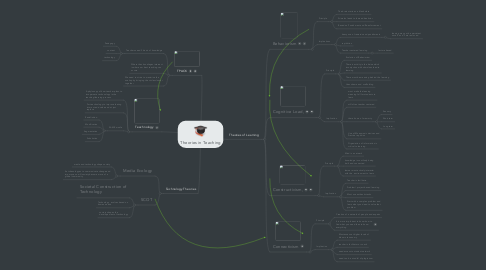
1. Technology Theories
1.1. Media Ecology
1.1.1. media and technology shape society
1.1.2. As tchenologyes to communicate change and imporove so will society become more of a global community
1.2. SCOT
1.2.1. Societal Construction of Technology
1.2.2. Technology evolves based on human needs
1.2.3. society shapes the developement of technology
2. TPACK
2.1. Teachers need 3 kinds of knowledge
2.1.1. Pedagogy
2.1.2. content
2.1.3. technology
2.2. Where thes knowleges intersect is where our best teaching can occure
2.3. We need to strive to maximize the overlap by bringing the circles closser together
3. Teachnology
3.1. A phylosopy of how teacher plans to incoperoate techonology in the teaching/learning process
3.2. For teachnology to improve learing ist must add value and ot just replace
3.3. SAMR modle
3.3.1. Redefinition-
3.3.2. Modification
3.3.3. Augmentation
3.3.4. Subsitution
4. Theories of Learning
4.1. Behaviorism
4.1.1. Principle
4.1.1.1. The brain starts as a blank slate
4.1.1.2. Stimulus leads to learned beahvior
4.1.1.3. Based on Punishment and Re-enforcement
4.1.2. Implications
4.1.2.1. heavy use of rewards and punishments
4.1.2.1.1. leaning may not be percistant once R and P are removed
4.1.2.2. repititition
4.1.2.3. Teacher centered learning
4.1.2.3.1. lecture based
4.2. Cognitive Load,
4.2.1. Principle
4.2.1.1. Evolution of Behaviorism
4.2.1.2. There is activity in the baine which inconjuction with stimulous lead to learning
4.2.1.3. There must be meaning behind the learning
4.2.1.4. Uses skema and scaffolding
4.2.2. Implication
4.2.2.1. must make the leaning meaning full for students to learn
4.2.2.2. still often teacher centered
4.2.2.3. there froms of memorty
4.2.2.3.1. Sensory
4.2.2.3.2. Short term
4.2.2.3.3. Long term
4.2.2.4. Use of Mneumonic devices and Practice repitition
4.2.2.5. Organiation of information is critical to learning.
4.3. Constructivism,
4.3.1. Principle
4.3.1.1. Mind is a network
4.3.1.2. knowledge is contilualy being built and connected
4.3.1.3. learner must actively interactw with the environment to learn
4.3.2. Implication
4.3.2.1. Teacher is facilitatro
4.3.2.2. Problem/ project based learning
4.3.2.3. Must use authentic tasks
4.3.2.4. Start with a complex problem and learn what you deed to solve that problem
4.4. Connectivism
4.4.1. Principle
4.4.1.1. Creation of a network of people and experts
4.4.1.2. It is more implortant to know how to find what you need then to know everything
4.4.2. Implication
4.4.2.1. Must assess at higher levels of blooms taxonomy
4.4.2.2. teacher is facilitator or coach
4.4.2.3. need access to student network
4.4.2.4. need too be mindful of plagiarism
